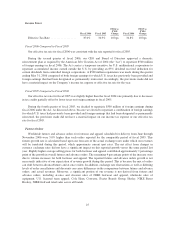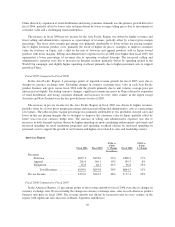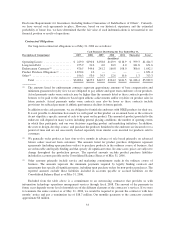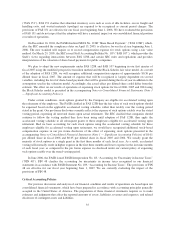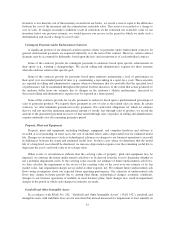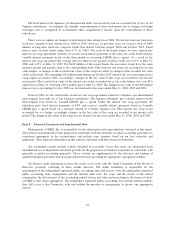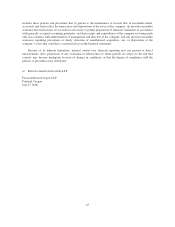Nike 2006 Annual Report Download - page 36
Download and view the complete annual report
Please find page 36 of the 2006 Nike annual report below. You can navigate through the pages in the report by either clicking on the pages listed below, or by using the keyword search tool below to find specific information within the annual report.(“FAS 151”). FAS 151 clarifies that abnormal inventory costs such as costs of idle facilities, excess freight and
handling costs, and wasted materials (spoilage) are required to be recognized as current period charges. The
provisions of FAS 151 are effective for our fiscal year beginning June 1, 2006. We have evaluated the provisions
of FAS 151 and do not expect that the adoption will have a material impact on our consolidated financial position
or results of operations.
On December 16, 2004, the FASB finalized SFAS No. 123R “Share Based Payment,” (“FAS 123R”) which,
after the SEC amended the compliance dates on April 15, 2005, is effective for our fiscal year beginning June 1,
2006. The new standard will require us to record compensation expense for stock options using a fair value
method. On March 29, 2005, the SEC issued Staff Accounting Bulletin No. 107 (“SAB 107”), which provides the
Staff’s views regarding interactions between FAS 123R and certain SEC rules and regulations and provides
interpretations of the valuation of share-based payments for public companies.
We plan to adopt the new requirements under FAS 123R and SAB 107 beginning in our first quarter of
fiscal 2007 using the modified prospective transition method and the Black-Scholes fair value model. As a result
of the adoption of FAS 123R, we will recognize additional compensation expense of approximately $0.36 per
diluted share in fiscal 2007. The amount of expense that will be recognized is largely dependent on several
variables, including the level of share-based payments that will be granted during the fiscal year in addition to the
assumptions used in the valuation model. Accordingly, the actual effect per diluted share could differ from this
estimate. The effect on our results of operations of expensing stock options for fiscal 2006, 2005 and 2004 using
the Black-Scholes model is presented in the accompanying Notes to Consolidated Financial Statements (Note 1
— Significant Accounting Policies).
Under certain conditions, stock options granted by the Company are eligible for accelerated vesting upon
the retirement of the employee. The FASB clarified in FAS 123R that the fair value of such stock options should
be expensed based on the applicable accelerated vesting schedule, rather than ratably over the vesting period
stated in the grant. Our pro forma disclosure currently reflects the expense of such options ratably over the stated
vesting period, expensing all unvested shares upon actual retirement. The SEC clarified that companies should
continue to follow the vesting method they have been using until adoption of FAS 123R, then apply the
accelerated vesting schedule to all subsequent grants to those employees eligible for accelerated vesting upon
retirement. Had we been accounting for such stock options using the accelerated vesting schedule for those
employees eligible for accelerated vesting upon retirement, we would have recognized additional stock-based
compensation expense in our pro forma disclosure of the effect of expensing stock options presented in the
accompanying Notes to Consolidated Financial Statements (Note 1 — Significant Accounting Policies) of $0.01
per diluted share in fiscal 2006 and $0.05 per diluted share in fiscal 2005 and 2004. We usually grant the
majority of stock options in a single grant in the first three months of each fiscal year. As a result, accelerated
vesting will normally result in higher expense in the first three months and lower expense in the last nine months
of each fiscal year, as compared to the pro forma expense we disclosed under our current policy of expensing
such options ratably over the stated vesting period.
In June 2006, the FASB issued FASB Interpretation No. 48, “Accounting for Uncertainty in Income Taxes”
(“FIN 48”). FIN 48 clarifies the accounting for uncertainty in income taxes recognized in our financial
statements in accordance with FASB Statement No. 109, “Accounting for Income Taxes”. The provisions of FIN
48 are effective for our fiscal year beginning June 1, 2007. We are currently evaluating the impact of the
provisions of FIN 48.
Critical Accounting Policies
Our previous discussion and analysis of our financial condition and results of operations are based upon our
consolidated financial statements, which have been prepared in accordance with accounting principles generally
accepted in the United States of America. The preparation of these financial statements requires us to make
estimates and judgments that affect the reported amounts of assets, liabilities, revenues and expenses, and related
disclosure of contingent assets and liabilities.
35


